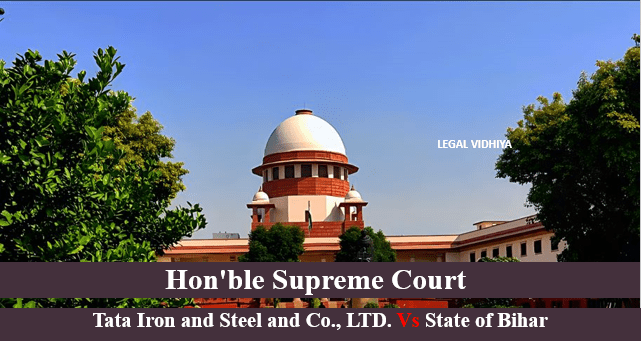
| Citation | 1958 AIR 452, 1958 SCR 1355 |
| Date of Judgement | 19/02/1958 |
| Court | Supreme Court |
| Appellant | Tata Iron and Steel and Co., LTD. |
| Respondent | State of Bihar |
| Bench | CJ Sudhi Ranjan Das, T. L. Venkatarama Iyer, S.K. Das, A.K Sarkar, Vivian Bose |
| Referred | Section 4 (1) and Section 2 (g) of Bihar Sales Tax Act,1947 |
Facts
Tata Iron and Steel and Co. carry their business in Jamshedpur, Bihar. The business was manufacturing iron and steel in their own factory. This company sends its goods (iron and steel) from Jamshedpur to various parts of India. The company was assessed to sales tax for two periods under Bihar Sales Tax Act, 1947. This act was enacted by the Bihar Legislature in exercise of exclusive power under Government of India Act, 1935. In the railway receipt, the company itself shows as the consignee, so the company pays the freight and sends the receipt either to their branch officers or bankers and when the price of goods is paid by the purchaser then only hand over the receipt to the purchaser. The amount shown as the gross turnover in the two returns for the two intervals, the company claimed the deduction in certain amounts on the grounds that none of the transactions in respect to the above claim sum in the property where the goods are purchased by a purchaser in Bihar. The company claimed such deduction as it will give company a benefit consideration for the goods manufactured in Bihar but sold, delivered and consumed outside Bihar (other parts of country). The appellant also claimed another deduction on the railway freight which is paid by the company.
Sales Tax Officer invalids both the claims and added the amounts of sales tax realized by the appellant which was from its purchasers to the taxable turnover. Later the case was appealed in the High Court, where one part of the matter was given in the favour of appellant and respondent did not appeal that part. The favour judgement was that the legality of adding the sales tax to the turnover and the other question decided by the Court was against the appellant that was related to the vires of the Act and validity of retrospective levy of sales tax under Section 4 (1) of the Act.
So the appellant appeal to the higher court on the matter which was given against the appellant.
Issue
- Whether the tax levied under Section 4 (1) read with Section 2 (g) of Bihar Sales Tax, 1947 falls under the meaning of sales tax in Entry 48 in List II of the seventh schedule of the Government of India, 1935?
- Whether the Act was vire and also the validity of retrospective imposition (levy) of Sales tax under Section 4 (1) of the Act?
- Whether there is sufficient nexus between the law and object that has been taxed?
Appellant’s Contention
The appeal of Tata Iron and Steel and Co. was that the tax levied on the company was not sales tax rather it was an excise duty as the tax which has been levied under Section 4 (1) read with Section 2 (g) of Bihar Sales Tax, 1947 does not come under the definition of sales tax as per Entry 48 in List II of the Seventh Schedule of the Government of India Act, 1935.
The provincial legislature (Bihar) has no power to impose sales duty as the theory of territorial nexus was inapplicable to sales tax as there was no real or sufficient nexus and the retrospective levy of sales tax under Section 4 (1) of the Bihar Sales Tax Act destroyed the indirect nature of sales tax and thus make it a direct tax on dealer which could not be passed to buyer or consumer.
Judgement
The Supreme Court judges held the contentions of appellant negative. The provisions of Section 4 (1) with Section 2 (g), second proviso, of Bihar Sales Tax Act (Amendment) Act, 1948 were within the legislative authority of the legislature of Bihar.
The word ‘Sales’ as defined in the Bihar Sales Tax Act, means the transfer of property in the goods sold. It also laid down circumstances that sale although completed elsewhere has to be deemed that it has been taken place in Bihar.
The appellant argument of contending it as an excise duty is not correct because as per the provisions of the Act the producer or manufacturer become liable to pay the tax not because he produced or manufactured the goods but because he sold them to consumers.
The theory of territorial nexus does apply to sales tax legislation, although sales tax is levied only on complete sale, it can also be enforced in particular case. One or more ingredients of sale may provide the connection between the taxing State and sale.
The Court also held that there is no scope of argument that the retrospective enforcement of the tax under Section 4 (1) of the Act could destroy the character and nature of the tax or it was ultra vires that is beyond the legislative competence of the Bihar Legislation.
The Court upheld the Act as valid as there was sufficient territorial nexus between the taxing provinces of the state and the sale wherever that had taken place. The appeals were dismissed with costs.
References
https://indiankanoon.org/doc/1629177/
This article is written by Akshat Sharma of Department of Law, Prestige Institute of Management and Research, Intern at Legal Vidhiya.




0 Comments